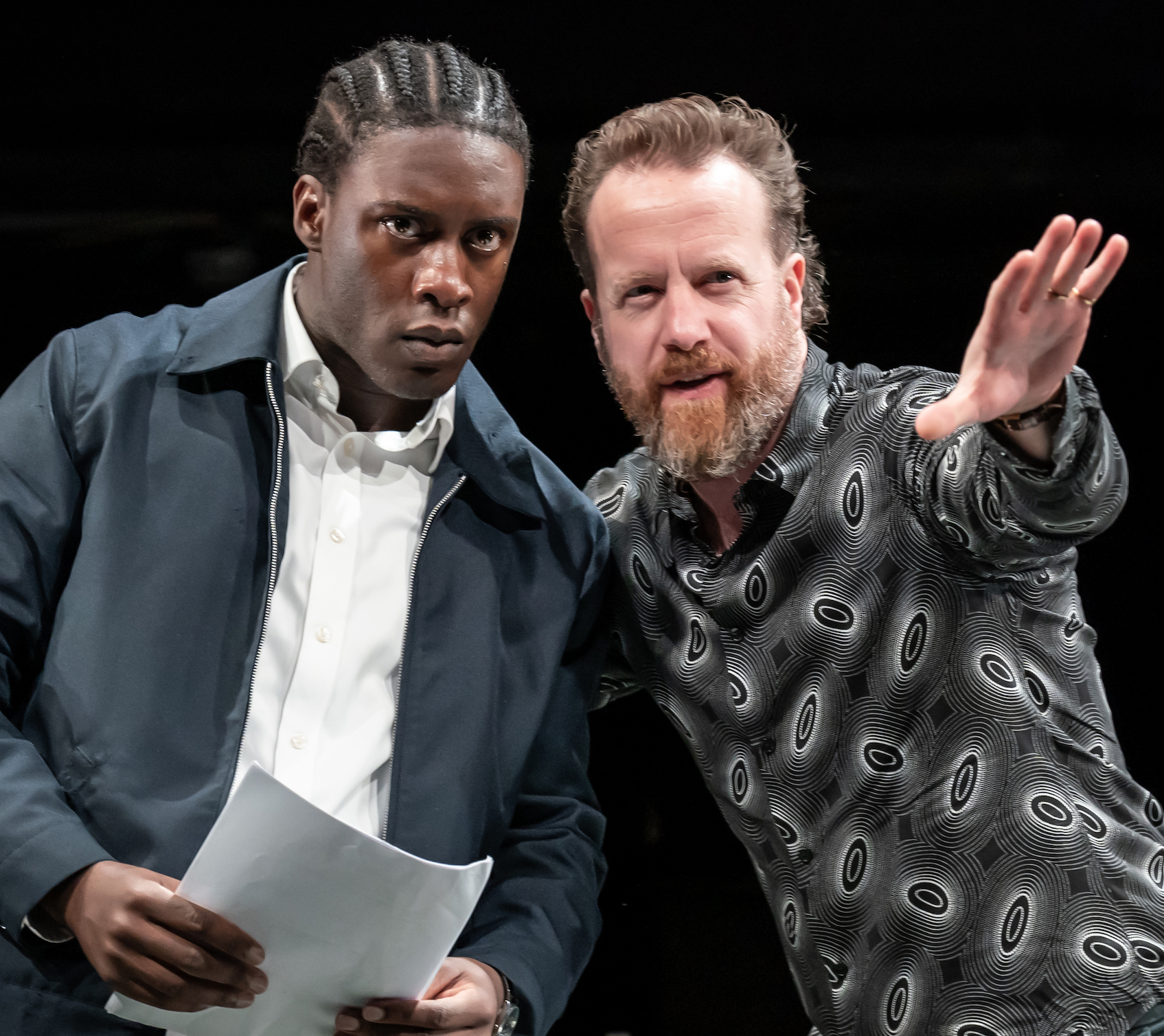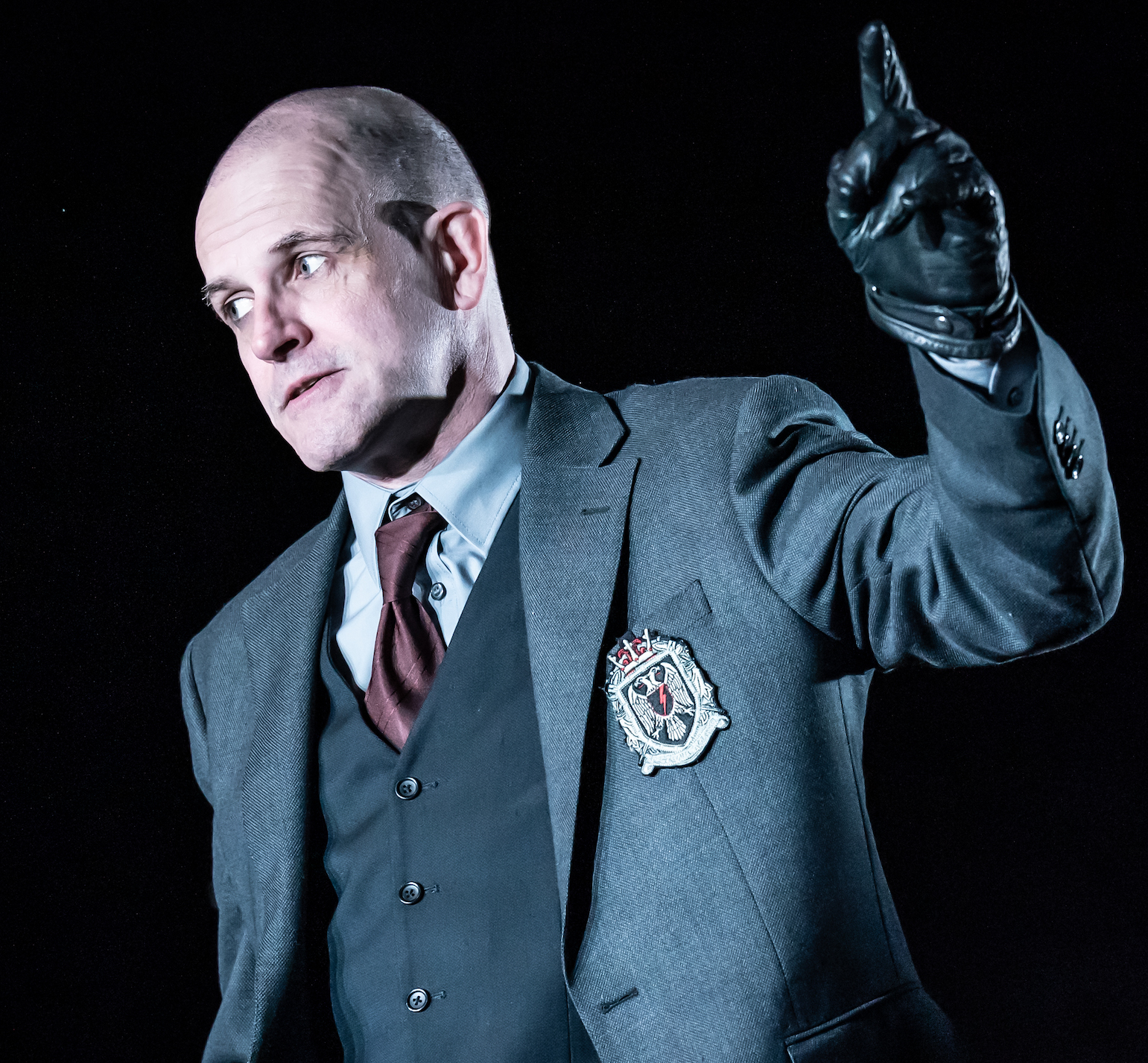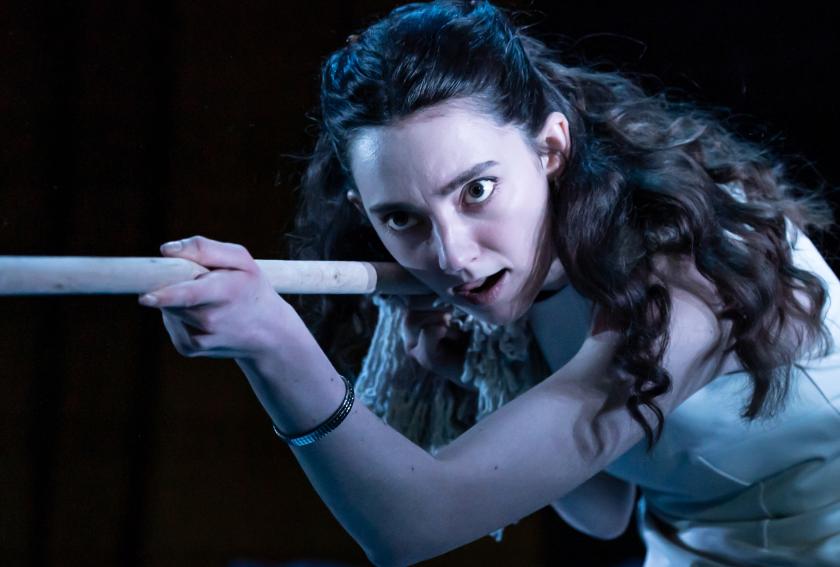Take dollops of Orwell and Kafka, with a sprinkling of Pirandello for a lighter texture, then bake. That could be the recipe for Sam Holcroft’s A Mirror, now transferred from the Almeida to the West End for a limited run.
It will probably be bait for the immersive theatre crowd, who get to play the congregation at the wedding of Leyla (Tanya Reynolds) and Joel (Samuel Adewunmi). Though this isn’t event theatre in the style of the hit show Joey and Gina’s Italian Comedy Wedding. This service is soon revealed to be a front for a samizdat play-reading being conducted at the Ministry of Culture by its director, Mr Čelik (Jonny Lee Miller), who has been led to this dangerous activity by his excitement at reading the promising debut play of a former sapper, Adem (Adewunmi, pictured below with Geoffrey Streatfeild).
As soon as the coast is clear, all the wedding paraphernalia is stowed away, Leyla reverts to being Mei, Čelik’s assistant, and Joel turns into Adem. Helping to workshop his piece is Bax, regarded by Čelik as “the motherland”’s finest playwright, though he admits Bax’s output has tapered off since his blistering debut play, a hard-hitting piece of social realism. Bax has been stirred by the verisimilitude in Adem’s writing into helping him make the play stageable.
 Adem here is a “mirror”, a man who can retain dialogue with 100% accuracy, which renders him a dangerous truth-teller. His portrait of the people in his building – who indulge in all manner of crimes and vices – isn’t fabricated, it’s what he hears them saying and doing through the thin walls of his flat. When Čelik asks him to write about a different topic, Adem obliges with a verbatim account of their first meeting at the ministry.
Adem here is a “mirror”, a man who can retain dialogue with 100% accuracy, which renders him a dangerous truth-teller. His portrait of the people in his building – who indulge in all manner of crimes and vices – isn’t fabricated, it’s what he hears them saying and doing through the thin walls of his flat. When Čelik asks him to write about a different topic, Adem obliges with a verbatim account of their first meeting at the ministry.
So far, so totalitarian. We understand the terrain here, the state censorship of autocratic regimes around the world. Too many infractions – Adem’s first draft has almost 150, Mei calculates – and the writer will be sent by the ministry to “the camps" for re-education. But Čelik, who stashes banned literature such as Shakespeare in his office, is unexpectedly keen to spare Adem this fate. He wants to refashion his play into something more appropriate with the help of Bax, who usefully fought at the same battle that Adem survived. Or rather, who was in army intelligence at the same time that Adem was on the battlefield, obeying clearly suicidal orders from an officer in a crisply laundered uniform.
The crux of the argument at this stage seems to be: how can theatre present harsh truths about social ills if, by doing that, the writer is likely to be silenced? Isn’t compromise on his or her part better if the play ends up being seen?
But this scenario isn’t enough for Holcroft, who proceeds to a major twist 10 minutes from the end that forces the audience to rethink everything they have so far seen. That’s tough on people already being challenged by the switcheroos of the piece. The character who delivers this twist (played by an imperious Jude Akuwudike) ends the play with the triumphal statement: “Audiences don’t want revolution, they want a gin and tonic!” It’s funny, but are we really being asked to see this pronouncement as a tragic truth about the state of theatre-going now? Perhaps so, but nothing in the previous 1hr and 50mins had made me take anything in the piece that deadly seriously.
 The tone of the production is knockabout farce, fuelled by the mocking sounds of an on-stage cellist, (Miriam Wakeling), who can niftily move from melodrama to melody via a Hendrix-like raunchiness. Reynolds is the main source of the comedy. Her every look and gesture can raise a laugh, from adjusting her bodycon wedding dress in the first scene to her robotic play-reading skills and presenting of arms (Mei too was in the army, in the artillery) with a mop.
The tone of the production is knockabout farce, fuelled by the mocking sounds of an on-stage cellist, (Miriam Wakeling), who can niftily move from melodrama to melody via a Hendrix-like raunchiness. Reynolds is the main source of the comedy. Her every look and gesture can raise a laugh, from adjusting her bodycon wedding dress in the first scene to her robotic play-reading skills and presenting of arms (Mei too was in the army, in the artillery) with a mop.
Miller (pictured right) reveals here that there is a darkly comedic side to him, a bullet-headed man with a hint of Leonard Rossiter’s latent savagery, aided by the simple costuming touch of black leather gloves and a blazer with the motherland's insignia on its pocket. And Streatfeild has a ball as Bax, a blowsy playwright whose fate has been to write a terrific first play that he couldn’t improve on after fame and the ministry of culture put him on a public pedestal.
What should lurk behind all the ingenious twists and turns of the action is the sinister sense that these characters really are in danger of violent suppression, if not annihilation. Instead their predicament becomes an amusing stage game that needs resolving. Director Jeremy Herrin has got his cast to play-act this set-up with total conviction, but it is nevertheless a hollow one, a vacuum that needs filling with real human substance or a concrete context if it is to be truly effective as a political piece.















Add comment